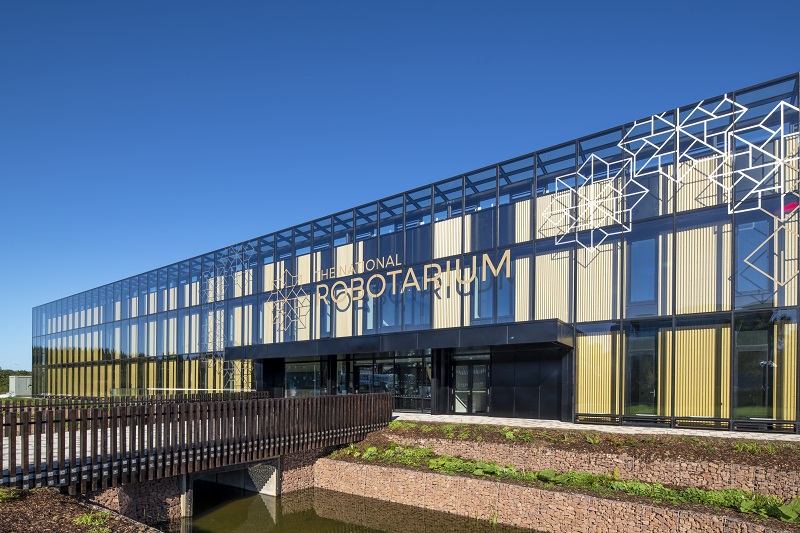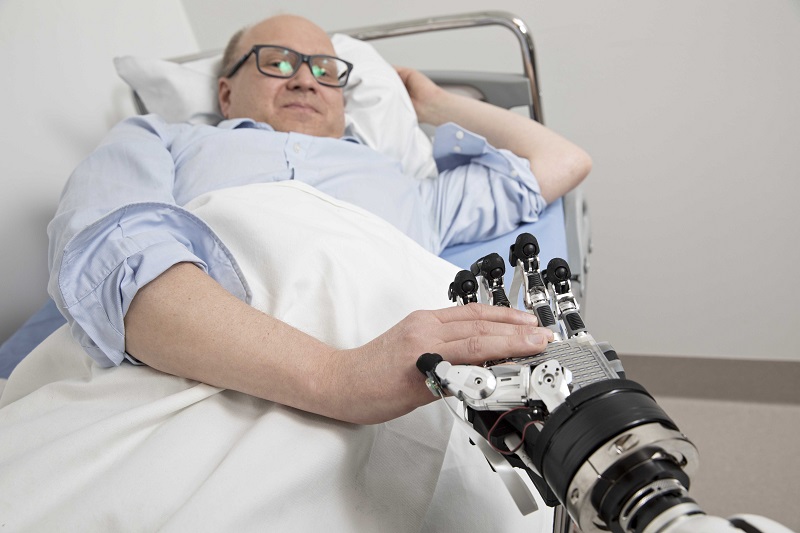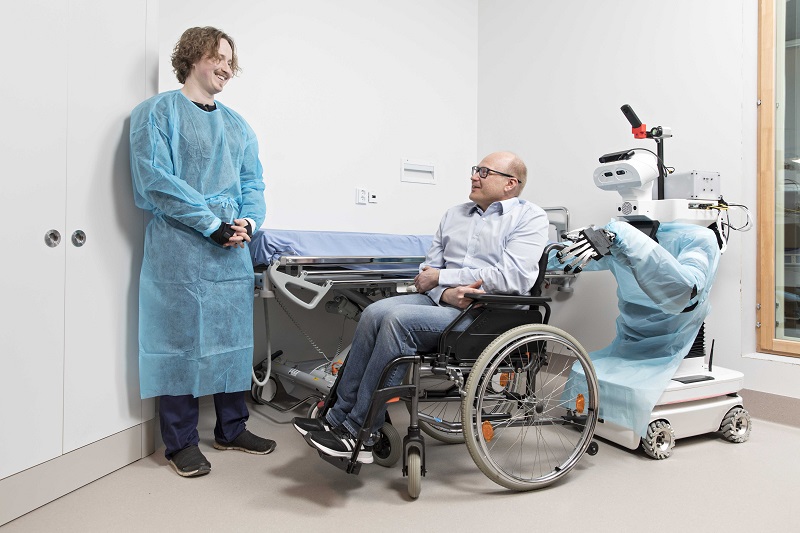A first-of-its-kind robot which gives clinicians the ability to ‘feel’ patients remotely has been launched as part of a Finnish hospital pilot by deep tech robotics company, Touchlab, a new tenant of the world-leading centre for robotics and artificial intelligence, the National Robotarium, at Heriot-Watt University in Edinburgh.
Controlled by operators wearing an electronic haptic glove, the Välkky telerobot is equipped with the most-advanced electronic skin (e-skin) technology ever developed to transfer a sense of touch from its robotic hand to users.
e-skin is a material which is made up of single or multiple ultra-thin force sensors to transmit tactile sensations like pressure, vibration, or motion from one source to another in real time.
The three3-month pilot at Laakso Hospital in Helsinki, Finland, will see a team of purpose-trained nurses explore how robotics systems can help deliver care, reduce workload, and prevent the spread of infections or diseases.
The most-advanced hospital in Europe
The pilot at Laakso Hospital is co-ordinated by Forum Virium Helsinki, an innovation company for the City of Helsinki.
And the research is part of a wider €7billion project aimed at developing the most-advanced hospital in Europe, due to be completed in 2028.
Envisioning a future where robots and caregivers collaborate seamlessly is something I find incredibly exciting
According to the World Health Organization (WHO), 15% of patients in low- and middle-income countries acquire at least one health care associated infection (HAI) during their hospital stay.
On average, one in every 10 affected patients die as a result of their HAI.
With over 43,000 registered nursing vacancies in England, it is hoped that Välkky will complement existing staff, freeing up people to focus on more-complex nursing tasks while allowing the robot to carry out day-to-day clinical duties like measuring vital signs including pulse, temperature and oxygen saturation.
It is also able to serve meals, move assistive devices, and support patient care with tasks like brushing hair.
Välkky was developed by Touchlab, which has just become a tenant at the world-leading National Robotarium in Edinburgh
Collaborative working
Additional applications for the technology could include nuclear decommissioning and the handling of toxic waste, helping reduce human exposure to jobs that are potentially hazardous to people’s health and wellbeing.
Touchlab is an Edinburgh-based start-up and has recently taken up residency at the National Robotarium, a pioneering new £22.4m research facility which officially opened its doors in September 2022.
Informed by sectoral needs, the facility works collaboratively with partners around the globe to define, develop, and resolve industry challenges through the application of robotics and AI.
Touchlab will benefit from the National Robotarium’s incubation facilities, state-of-the-art labs, and engineering expertise.
The National Robotarium is part of the Data-Driven Innovation initiative, supported by £21m from the UK Government and £1.4m from the Scottish Government.
Our long-term goal is for Välkky to assist in a variety of day-to-day ward tasks to ensure the delivery of comprehensive patient monitoring and care
The initiative aims to turn Edinburgh into the data capital of Europe and is part of the wider £1.3billion Edinburgh and South-East Scotland City Region Deal.
Kirsi Ahonen is head nurse and project manager at Laakso Hospital. She said: “Envisioning a future where robots and caregivers collaborate seamlessly is something I find incredibly exciting.
“Our long-term goal is for Välkky to assist in a variety of day-to-day ward tasks to ensure the delivery of comprehensive patient monitoring and care.
“While Välkky will initially be deployed on a smaller scale, undertaking tasks like retrieving fallen items or taking patient vitals, it has the potential to help with a number of more-complex jobs. This includes patient lifting, which could help alleviate potential physical injuries for staff, and reducing the spread of infection.
The robot will be able to carry out day-to-day clinical duties like measuring vital signs including pulse, temperature and oxygen saturation
Cutting-edge technology
“The integration of cutting-edge robotics into our healthcare team marks an exciting milestone and innovative technology like Välkky has the potential to revolutionise how we deliver patient care, support our dedicated staff, and continue to provide exceptional care for our patients.”
Touchlab chief executive, Dr Zaki Hussein, added: “In the past, telerobots have been limited to being able to see, hear, and speak on behalf of the people using them. Now, thanks to our innovative e-skin technology, robots like Välkky can ‘feel’ too – and not only on their fingertips.
As robotic and AI technologies continue to advance, we increasingly have the opportunity to support people in jobs that are potentially hazardous to their health or physical wellbeing
“This ground-breaking pilot with our partners at Laakso Hospital is helping to enable new and unprecedented applications in robotics and it is our ambition that the anonymised, real-time data gathered throughout the project will help prove that semi-autonomous robots can co-exist with and support professionals in a variety of industries like healthcare and the transition to greener energy sources.
“Having access to the National Robotarium’s state-of-the-art office and lab facilities, including its ecosystem of collaborators, industry experts, and academic teams, will support us to put these findings into action and to continue developing impactful robotics technologies that are changing our collective futures.”
And Lisa Farrell, business development manager at the National Robotarium, told BBH: “We work hand-in-hand with dynamic partners at the forefront of AI and robotics technologies, creating innovative solutions to global challenges that have a positive impact on society.
“As robotic and AI technologies continue to advance, we increasingly have the opportunity to support people in jobs that are potentially hazardous to their health or physical wellbeing.
“Touchlab’s Finnish pilot exemplifies that opportunity, with benefits of the trial expected to include increasing nurse productivity and, significantly, reducing the spread of healthcare acquired infections.
“Working with tenant companies like Touchlab, the National Robotarium continues to be a globally-significant collaborative hub - bringing together academics and industry-leading companies, acting as a catalyst for entrepreneurship and delivering sustainable economic benefit to the whole of the UK and beyond.”
The technology could also help with infection prevention and control, meal delivery, and patient transfer
